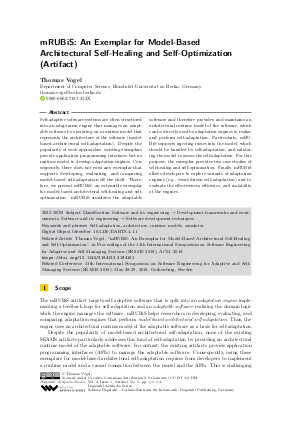mRUBiS: An Exemplar for Model-Based Architectural Self-Healing and Self-Optimization (Artifact)
Author Thomas Vogel
-
Part of:
Issue:
Special Issue of the 13th International Symposium on Software Engineering for Adaptive and Self-Managing Systems (SEAMS 2018)
Part of: Volume: DARTS, Volume 4 (ECOOP 2018)
Part of: Journal: Dagstuhl Artifacts Series (DARTS) - License:
 Creative Commons Attribution 3.0 Germany license
Creative Commons Attribution 3.0 Germany license
- Publication Date: 2018-05-23
Artifact Description

PDF
DARTS.4.1.1.pdf
- Filesize: 284 kB
- 4 pages
Document Identifiers
Subject Classification
Keywords
- Self-adaptation
- architecture
- runtime models
- simulator
Metrics
- Access Statistics
-
Total Accesses (updated on a weekly basis)
0Document
0Metadata
Artifact
DARTS-4-1-1-artifact-1e9de8c6a61c2850006c5f631dcc32a3.tgz
(Filesize: 5.62 MB)
MD5 Sum:
1e9de8c6a61c2850006c5f631dcc32a3
(Get MD5 Sum)
Abstract
Self-adaptive software systems are often structured into an adaptation engine that manages an adaptable software by operating on a runtime model that represents the architecture of the software (model-based architectural self-adaptation). Despite the popularity of such approaches, existing exemplars provide application programming interfaces but no runtime model to develop adaptation engines. Consequently, there does not exist any exemplar that supports developing, evaluating, and comparing model-based self-adaptation off the shelf. Therefore, we present mRUBiS, an extensible exemplar for model-based architectural self-healing and self-optimization. mRUBiS simulates the adaptable software and therefore provides and maintains an architectural runtime model of the software, which can be directly used by adaptation engines to realize and perform self-adaptation. Particularly, mRUBiS supports injecting issues into the model, which should be handled by self-adaptation, and validating the model to assess the self-adaptation. For this purpose, the exemplar provides two case studies of self-healing and self-optimization. Finally, mRUBiS allows developers to explore variants of adaptation engines (e.g., event-driven self-adaptation) and to evaluate the effectiveness, efficiency, and scalability of the engines.
Cite As Get BibTex
Thomas Vogel. mRUBiS: An Exemplar for Model-Based Architectural Self-Healing and Self-Optimization (Artifact). In Special Issue of the 13th International Symposium on Software Engineering for Adaptive and Self-Managing Systems (SEAMS 2018). Dagstuhl Artifacts Series (DARTS), Volume 4, Issue 1, pp. 1:1-1:4, Schloss Dagstuhl – Leibniz-Zentrum für Informatik (2018)
https://doi.org/10.4230/DARTS.4.1.1
BibTex
@Article{vogel:DARTS.4.1.1,
author = {Vogel, Thomas},
title = {{mRUBiS: An Exemplar for Model-Based Architectural Self-Healing and Self-Optimization (Artifact)}},
pages = {1:1--1:4},
journal = {Dagstuhl Artifacts Series},
ISSN = {2509-8195},
year = {2018},
volume = {4},
number = {1},
editor = {Vogel, Thomas},
publisher = {Schloss Dagstuhl -- Leibniz-Zentrum f{\"u}r Informatik},
address = {Dagstuhl, Germany},
URL = {https://drops.dagstuhl.de/entities/document/10.4230/DARTS.4.1.1},
URN = {urn:nbn:de:0030-drops-87102},
doi = {10.4230/DARTS.4.1.1},
annote = {Keywords: Self-adaptation, architecture, runtime models, simulator}
}
